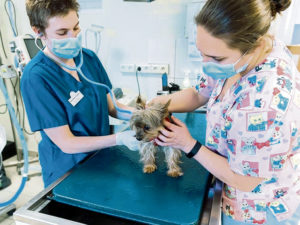
A permanent change of station move is stressful as it is, but moving with your pet can add an extra layer of stress unless you are well prepared. Public Health Command Europe Veterinarians have some tips to help make moving your furry companion as easy as possible.
“As soon as you know your travel details, contact your local veterinary treatment facility to assist with your upcoming pet travel process,” said Maj. Jamie Case, a veterinarian and officer in charge of the Wiesbaden Veterinary Treatment Facility. “Some countries, such as Japan, Guam or the United Kingdom, have specific requirements for importing a pet and can take over six months to prepare. Therefore it’s important to prepare for your move ahead of time.”
Your Veterinary Treatment Facility can help prepare you for a smooth move.
For any PCS, the following documentation is required:
- Proof of an up-to-date rabies vaccine is required (i.e. rabies certificate issued by an on-base vet clinic or an official European Union Pet Passport issued by a licensed off-base vet.)
Note: Pets must be at least 12 weeks old to receive the rabies vaccine. If this is your pet’s first rabies vaccine, your pet must be vaccinated at least 28 days prior to travel to allow the vaccine to take effect. - Your pet must be microchipped. Any brand/type of microchip works. (Preferably with a 15 digit ISO microchip.)
- Health certificates are required for all pets and are only valid for 10 days after being issued. Health certificates can be issued from an on-post or off-post veterinarian as long as they are in English. Health certificates must be legible, accurate, and complete.
- An Acclimation Letter (This must be obtained from your veterinarian if your pet will be traveling in cabin or cargo)
“It is important to remember summer is peak PCS season so the on-post veterinary clinic appointments fill up quickly,” Case said. “I recommend making your appointment well in advance to ensure your pet can be seen at the appropriate time.”
Public Health Command Europe veterinarians recommend consulting the USDA Animal and Plant Health Inspection Service website for any country requirements and additional resources.
Your method of travel may have separate and additional requirements. Check with your airline or shipping carrier to determine what requirements they may have, if any.
Case added it is the responsibility of the pet owner to make sure their pet has met the requirements of the destination country. A failure to meet the requirements can cause difficulties upon arrival in the destination country.
If you have any questions or concerns, please contact your local veterinary treatment facility for help.


